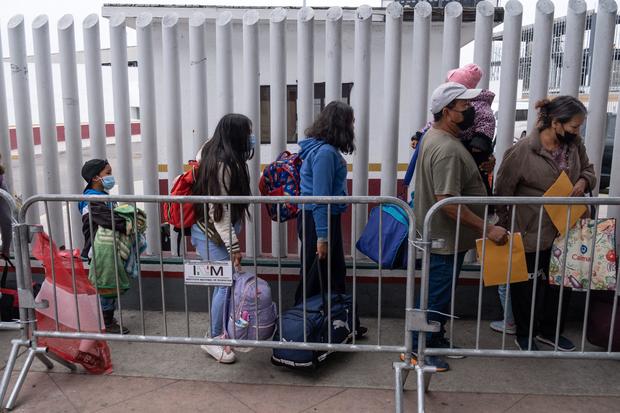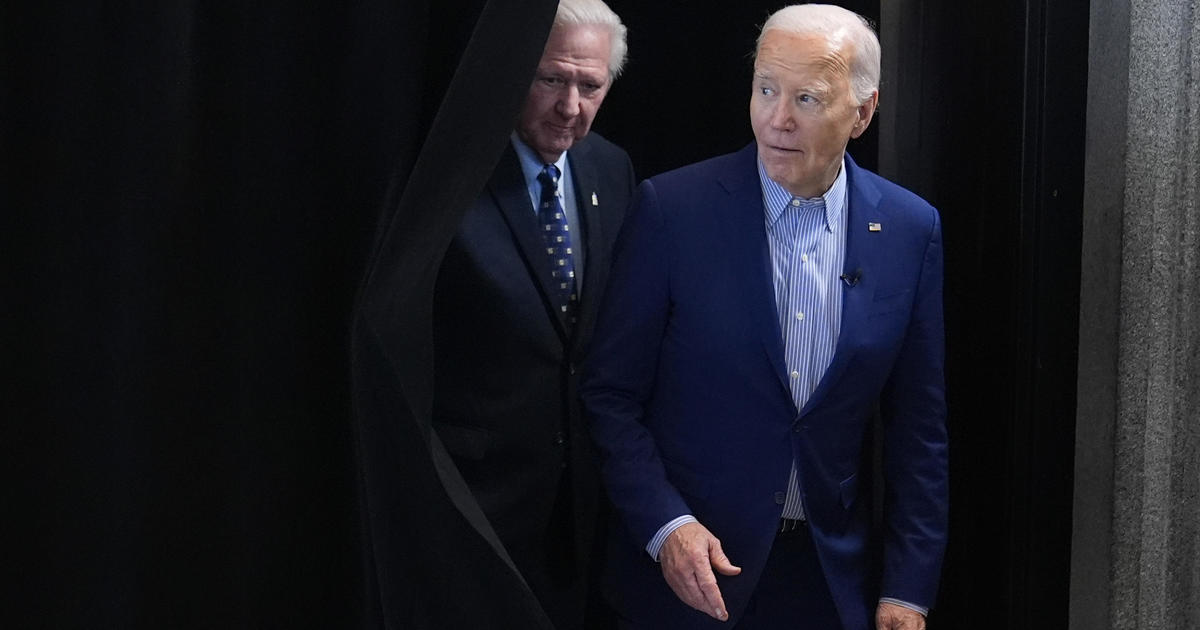U.S. plans to admit nearly 40,000 asylum-seekers per month through mobile app
The Biden administration is planning to dramatically expand the processing of asylum-seekers along the U.S.-Mexico border by admitting nearly 40,000 migrants at official crossings each month, an unprecedented number, Department of Homeland Security officials told CBS News Wednesday.
Starting in June, officials will allow more migrants waiting in Mexico to secure an appointment to enter the U.S. through a government phone app known as CBP One, which the Biden administration has transformed into the main gateway to the American asylum system.
U.S. border officials are preparing to distribute 1,250 appointments each day — or roughly 38,750 each month — to migrants in Mexico so they can present themselves at ports of entry for an opportunity to be allowed inside the country to request asylum, DHS officials said.
Previously, U.S. officials processed just over 20,000 asylum-seekers each month under the CBP One system, which President Biden unveiled in January as an orderly process to discourage migrants from entering the U.S. illegally by crossing between ports of entry. Seeking asylum at a port of entry is legal under U.S. law.
In a statement to CBS News, DHS confirmed the increase in appointments, saying it would evaluate whether to expand port of entry processing even further.
"This is a continuation of the Biden administration's expansion of lawful pathways and opportunities to access them, including CBP One appointments," Homeland Security spokesperson Erin Heeter said. "The process cuts out smugglers while also providing a safe, orderly, and humane process for noncitizens to access ports of entry instead of attempting to enter the United States unlawfully."
Biden administration officials have said that border authorities need to balance the processing of asylum-seekers at ports of entry with their responsibilities to facilitate legal trade and travel at these same locations.
The CBP One app allows migrants north of Mexico City to request an appointment to appear at a southern border port of entry, where U.S. officials generally release them with an immigration court hearing in their respective destination. Migrants can fight their deportation in court by seeking asylum.
The app-powered system has been sharply criticized by migrant advocates, who say it penalizes the most destitute migrants who don't have smartphones or an internet connection. They have also said the app does not allocate nearly enough spots to help the tens of thousands of migrants stranded in Mexico.
But the app has also facilitated the largest expansion of migrant processing at ports of entry along the southern border in U.S. history. Since its use began in January, more than 120,000 migrants have secured appointments to enter the U.S. through CBP One, according to unpublished government figures.
During the five years before the coronavirus pandemic, an average of 326 migrants were processed at ports of entry along the U.S.-Mexico border per day, according to government data.
At first, the U.S. distributed roughly 740 CBP One spots each day. Earlier this month, Customs and Border Protection (CBP) increased the number of daily appointments to 1,000, as part of broader border strategy following the expiration of the Title 42 pandemic rule, which allowed officials to summarily expel migrants on public health grounds.
The decision to expand daily port of entry appointment for migrants to 1,250 is part of the Biden administration's gamble that combining expanded opportunities for migrants to enter the U.S. legally with increased penalties for those who cross the border illegally will reduce unlawful crossings, which reached record levels during Mr. Biden's first two years in office.
A Biden administration regulation implemented earlier this month renders migrants ineligible for asylum if they cross the southern border unlawfully after not seeking protection in a third country on their way to the U.S. Those subject to the rule face swift deportation to Mexico or their native countries, as well as a five-year exile from the U.S.
But the restriction does not apply to migrants who show up at ports of entry with a CBP One appointment. They are allowed to seek asylum under the normal procedure, though their cases may not be adjudicated in years due to the two million and growing backlog of pending cases before the U.S. immigration court system.
In addition to the CBP One process and the asylum restriction, administration officials have also sought to deter illegal border crossings by allowing up to 30,000 migrants from Cuba, Haiti, Nicaragua and Venezuela to fly to the U.S. directly per month if they have American sponsors. In just several months, that program received over 1.5 million applications.
While the number of unlawful border crossings soared to record levels in the days leading up to Title 42's end on May 11, migrant arrivals subsequently plummeted, defying predictions that the policy's end would trigger a massive increase in migration.
While the Trump administration often urged migrants to wait for a chance to be processed at a port of entry if they wanted to seek asylum, the Biden administration's effort to facilitate just that has been strongly criticized by Trump-era officials, Republican lawmakers and immigration hardliners.
Sen. Josh Hawley of Missouri, a Republican, compared the process to "a concierge service for illegal immigrants." When he announced a new lawsuit against the Biden administration earlier this month, Texas' now-impeached Attorney General, Ken Paxton, said CBP One was part of an effort to allow "illegal aliens to stream into this country."
While Paxton's lawsuit focused its criticism on the CBP One system to process asylum-seekers, it challenged the Biden administration's asylum restriction, which disqualifies migrants who don't seek asylum in third countries unless they use the app. If it prevails, the lawsuit would not halt the processing of migrants at ports of entry.





